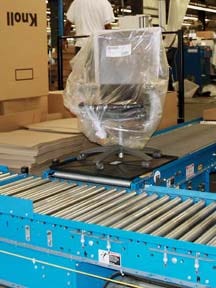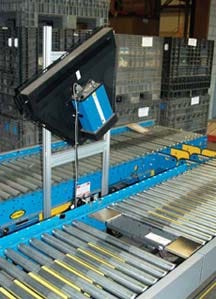Auto-ID system polishes furniture production
January 30, 2014
Knoll Mfg., an office furniture manufacturer in East Greenville, PA, is recognized internationally for creating workplace furnishings that “inspire, evolve and endure.” The company's commitment to innovation and modern design has yielded a comprehensive portfolio of office systems, seating, files and storage, tables and desks, wood case goods, textiles and accessories.
Recently, Knoll added an automatic material-handling/order-tracking system for its office chair production and packaging operation that is significantly cutting costs, eliminating order-processing mistakes and expediting the shipping process. The system combines radio-frequency identification (RFID) technology, bar-coding technology and equipment from Accu-Sort Systems (www.accusort.com), new conveyors and handling units from Stokes Material Handling (www.stokesmhs.com), which also coordinated the project, and system software, controls, scanners and other components from BP Controls, Inc., (www.bpcontrols.com). Knoll's production complex in East Greenville, has a chair-production building incorporating four primary office-chair manufacturing lines that produce its Chadwick, Life, RPM® and Bulldog® brands of furniture.

To convey downline and be tracked properly, fully assembled office chairs wrapped in film, like the one above, are placed in a reusable plastic tray affixed with an RFID tag that acts as a ‘license plate,’ identifying the chair throughout the plant. The tag is encoded using an RFID tag writer/reader.
Previously, after a chair was assembled, tested and completed, it was labeled by hand with a manufacturing tag that included a shipping date, a routing code, a case/pallet number, an order type and number, an item number, the product quantity and more.
The chair was then wrapped in a protective film or it was loaded into a shipping case and palletized with up to four chairs per pallet.
The pallets were then forklifted to the shipping area, across the building, approximately 1,000 ft away, to one of three Knoll “mixing,” or staging centers, where the chair might be combined in a shipment with other pieces of office furniture. From there, the chair was distributed to retail outlets or directly to customers.
The setup kept the facility in a constant flurry of activity, with forklifts shuttling back and forth between the plant's manufacturing and shipping areas. This raised a number of concerns, including forklift maintenance and fuel costs and warehouse safety, according to Knoll. But, the biggest concern was order integrity; the chairs could accidentally be delivered to the wrong staging area, causing costly shipping mistakes or delays.
To alleviate the traffic problem and streamline the order-tracking process, Knoll contacted Stokes Material Handling to develop an automated material handling system that could:
Identify chairs by order number, purchase-order number and by their destination.
Automatically convey the chairs to the correct sorting area
Automatically direct the shipments to the proper dock door.
Stokes Material Handling provided new conveyors (including those from Hytrol [www.hytrol.com]) and automatic chair lifts to facilitate the new process and recommended RFID systems from Accu-Sort and controls from BP Controls to create a new tracking method.
Today, Knoll designates chairs as either Packed (case-packed) or Wrapped (film-wrapped). A Packed chair is case-packed into a two-piece corrugated shipping case, labeled with production details that include product information and a chair description, customer identification, an order number and a line item.
To optimize use of shipping trailer space, Knoll also recently modified its Packed-chair product line so that 80 percent of production is shipped disassembled, with the chair base detached from the rest of the assembly.
All of the chair parts are then packed into a smaller, downsized case. The Wrapped chairs, however, are fully assembled, so they cannot be conveyed the same way. Instead, they are draped for shipment in a clear film shroud and are conveyed through the plant and shipped upright.
When a chair is complete, the production department produces a bar-coded label from a desktop printer containing information about the chair, including the mixing-center destination (or direct shipping). Applied to the front of the case, the labels for the Packed chairs can be easily scanned using fixed-position scanners at the conveyor level.
But labels applied to the film on the Wrapped chairs, which can swivel and rotate up to 360 deg, make bar-code-scanning a challenge, as the label location on the Wrapped chairs cannot always be assured. So the Wrapped, assembled chairs are placed in a reusable conveyor tray that makes them easier to transport down the packaging lines.
Knoll realized that the conveyor tray became an ideal application for radio-frequency identification (RFID) tagging. Each tray incorporates an RFID tag from Accu-Sort, encased in plastic and affixed to the tray with Velcro®. Acting as a sort of 'license plate,' the information on the RFID tray tag is easy to read as the chair is convey downline in a closed-loop system.
Positioned in the center of the square conveyor tray to make orientation a nonissue, the tag is written with Accu-Sort's RFR-02 RFID tag reader/writer with new order information each time the tray receives a new chair. Once the chair reaches the end of the line, the tray is brought back to the start of the production line and the tag is overwritten with new information when another chair is loaded into the tray.
Both Wrapped and Packed chairs are processed on any of the four production lines. At the end of each chair line, the chairs enter what Knoll calls an “induction area,” which houses an RFID station that “inducts” the chair into Knoll's computer system using chain transfers and merge-control logic. It's equipped with a small control console designed by BP Controls, consisting of a selector switch with a send button, a hand-held scanning gun, a two-stage beacon and an Accu-Sort RFR-02 RFID tag reader/writer.
Compatible with the ISO 15693 standard, the high-frequency, fixed-position tag reader/writers operate at 13.56 mHz, reading and writing Knoll's passive tags (RF transponders). The HF reader/writer system has 5x16-in. antennas and is designed for use in factory automation, automated material handling and asset identification. Each of the primary RFID/induction areas is also equipped with an automatic lift built by Stokes Material Handling that allows the operator to roll either the film-wrapped chairs onto the conveyor trays or place the chairs to be case-packed into corrugated shipping containers at ground level.
When a chair arrives in the induction area, an operator reads a work order that corresponds to the chair to determine whether it will be Packed or Wrapped.
For Packed chairs, the operator moves the console's selector switch to the Pack position, places a case bottom on the lift, loads the chair into the case and seals the case before pushing the “send” button so that the chair can proceed downline. The label, or ticket, on the package is scanned with a BP Controls hand-held scanner and the case is automatically raised and transferred to the line.
For Wrapped chairs, an operator moves the switch in the Wrap position and places a plastic conveyor tray onto the lift. The operator then rolls the chair into the conveyor tray and scans the bar-coded production label onto the plastic film shroud with the hand-held scanner. The scanned information is then sent to a Rockwell Automation (www.rockwellautomation.com) Allen-Bradley SLC 5/05 processor/programmable logic controller provided by BP Controls, which formats the same scanned information for the RFR-02 RFID writer. The RFID writer then encodes that information onto the RFID tag on the conveyor tray.

RFID stations with a control console and scanner, above, are in place in the ‘induction areas’ at the end of each packaging line at Knoll Mfg.’s production facility.
The beacon at each of the induction areas flashes as the tag is being written. When the tag-writing operation is successful, the beacon turns green, and the lift automatically raises the chair and discharges it to the main line. If tag writing fails (poor alignment, bad scan, etc.), the beacon turns red, and the operator repeats the process. If the tag does not write successfully, the system will not induct the chair onto the main line.
As the chairs travel to shipping, they first pass a strapping-verification area, which is equipped with an Accu-Sort Axiom™ laser bar-code scanner and an RFR-02 RFID tag reader. The Axiom provides high-speed scanning of the containers at rates up to 1,400 scans/sec, Accu-Sort reports
The RFID tag reader detects a tag on the conveyor tray holding a Wrapped chair, allowing the Wrapped chair to bypass a strapping station next in line and proceed to a sortation area.
But if the Axiom bar-code scanner detects a bar-coded label on the case of a Packed chair, it signals the chair to be diverted from the main line to proceed through the strapping area, which is equipped with two automatic strappers from EAM-Mosca (www.eammosca.com) that apply four straps.
At the strapping station, the cases are oriented so that the case front, and its production label, face the side. The strapped cases them are automatically “re-inducted,” or routed, back onto the main line, with the front of each case facing one side.
Next, both Wrapped and Packed chairs enter the sortation area, where an Accu-Sort Model 24i DRX side-reading bar-code scanner with periscope checks the PACKED, oriented shipping cases of chairs with the bar-coded labels and another RFR-02 RFID reader/writer scans and verifies the RFID tag on the WRAPPED chairs. The data is sent to a sortation PC that determines which outbound production lane to send the chairs for distribution. The side-read scanner is able to provide up to 3,000 scans/sec and has a reading range of up to 70 in., Accu-Sort notes.
The chair is then tracked and sorted to the proper outbound shipping lane or dock. The sortation PC identifies the product, providing specific lane assignments specified at the mixing center, by order number or by line item.
Knoll's Carl Visscher, manufacturing plant manager, says that the company is pleased with the combination RFID/bar-coding system, which has helped Knoll improve throughput and reduce shipping errors. With it, Knoll expects to save indirect labor costs of $300,000 and another $200,000 in cost avoidance because the chairs no longer need to be staged for pickup by forklift. Instead, they can be delivered directly to the shipping area, for more efficient warehouse utilization. Visscher points to a few of the system's other benefits: “The new method helps cut forklift fuel and maintenance costs significantly and reduces forklift traffic, improving our plant safety,” he says. “If we chose another type of scanning setup, we probably would have seen a major increase in our investment. We should see an ROI in three years, including depreciation on equipment, and both hardware and software.”
More information is available: |
Accu-Sort Systems, Inc., 215/996-8601. www.accusort.com. |
BP Controls, Inc., 732/257-8700. www.bpcontrols.com. |
EAM-Mosca Corp., 800/456-3420. www.eammosca.com. |
Hytrol Conveyor Co., Inc., 870/935-3700. www.hytrol.com. |
Rockwell Automation, 414/382-2000. www.rockwellautomation.com. |
Stokes Material Handling Systems, Inc., 215/340-2200. www.stokesmhs.com. |
You May Also Like


